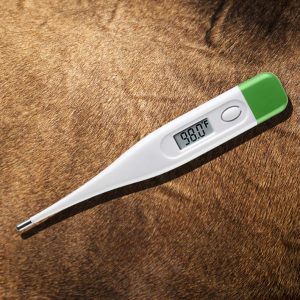
Horse Vital Signs Part 1 – What Is My Horse’s Normal Temperature?
Check your horses’ vital signs when they are at rest so you can determine what is normal.
A cool fact about your horse’s temperature:
Horses thermoregulate; in other words, they maintain a constant internal body temperature regardless of how hot or cold it is in the environment around them. If a horse’s temperature goes too high or stays elevated for long periods of time, it can negatively impact their health.
What’s normal?
A normal temperature for an adult horse ranges from 98°F to 101.5°F. The average is 100°F.
A slight fever is two or three degrees higher than your horse’s normal temperature.
A high fever is three or more degrees higher than your horse’s normal temperature.
If your horse’s temperature is above 106°F this is an extremely high fever. Call your vet.
A foal that is less than one month old will have a normal temperature range between 100°F and 102°F. Foals are at greater risk for overheating.
Low temperatures are only a problem is a horse is in circulatory shock or septic shock. In a healthy horse, a low temperature is not a problem. Foals are at greater risk for hypothermia because of their smaller body mass and immature thermoregulatory system.
High temperatures (above 101.5°F) should always be evaluated immediately.
What can cause a high temperature?
Strenuous exercise can increase a horse’s body temperature a couple of degrees, but this isn’t considered an emergency as long as the temperature returns to normal within 90 minutes of finishing work.
Heat stress or heat stroke can occur in horses that are sick, working, being shipped or otherwise stressed in hot, humid conditions. Temps run as high as 105°F to 107°F. Other symptoms include rapid pulse, panting, stumbling and weakness, dry skin, and dehydration. Horses with anhidrosis (inability to sweat) are at high risk for developing heat stroke. Seek immediate veterinary care for this type of high temperature.
Vaccinations can lead to elevated body temperatures in some horses. The temperature can be a simple immune response to the vaccine or it could signal an infection may be developing at the injection site. Jot down any other symptoms you notice, e.g., sore neck, heat or swelling at the injections site or overall depression, and then consult with your veterinarian.
Illness or infection can cause a rise in body temperature. Typically, there are other symptoms that accompany a high fever that is caused by illness or infection, but sometimes the temperature is your first warning sign something is wrong. Unexplained high temperatures should be reported to your veterinarian as soon as possible.



1 Comment
Pingback
[…] Horse Vital Signs Part 1 – What Is My Horse’s Normal Temperature? […]